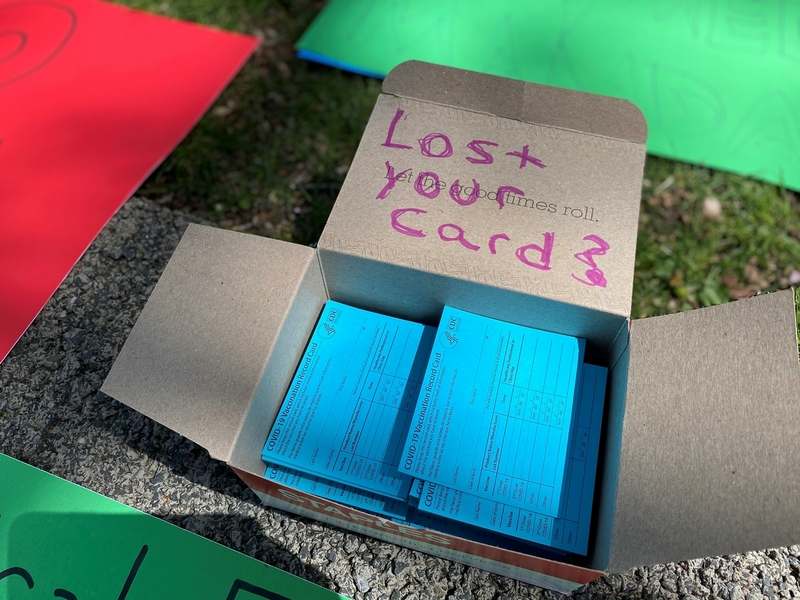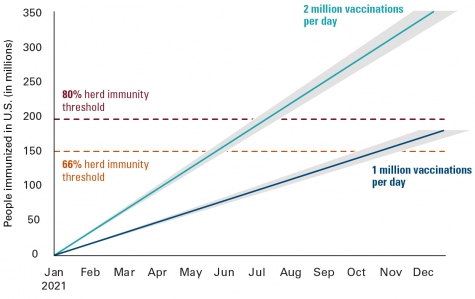
Eden Milligan | Head Editor
April 30, 2021
Although Covid vaccines are available to adults (16 and older) across the country, not everyone is getting them. Of course, this was anticipated, and it may not pose a serious threat for allowing the virus to continue to spread and mutate. There is anticipation of a virtual end to Covid once “herd immunity” is reached, which means that the vaccination rate is high enough to cut off the links in transmissions that continue the spread of the virus.
Unfortunately, herd immunity might not be possible, as it takes a great number of vaccinations to effectively sever transmission pathways of a highly contagious virus. Further, scientists currently do not know exactly what the threshold for herd immunity might be, though most current estimates place the threshold at 60-70% of the population achieving immunity.

Fear of symptoms, distrust in the safety of Covid vaccines, past negative experiences with vaccinations, and conspiracies are some of the factors that push people away from getting vaccinated. Yet there are also many motivating factors for receiving a full vaccination. For example, there is speculation that vaccine cards might be required for work, school, travel, volunteering, and various events in the future. This would allow a return to the pre-Covid normal in some respects while ensuring the continued prevention of the spread of Covid. It’s really not so far-fetched: after all, to be a student at SCHS, and in all public schools in California, one must receive vaccinations to over ten different diseases. A requirement of Covid vaccination might have the indirect benefit of motivating more people to get vaccinated.
However, there are always people who will rebel against whatever guideline is sent their way. In anticipation of a potential future use for Covid vaccine cards as required proof of vaccination, vendors across the US have been selling fake vaccination cards online and on city streets. The FBI released a notice in March, when the issue first arose, declaring that the creation or purchase of fake vaccination cards is illegal. However, sales only increased over the next month.
To combat this, the CDC took action in reacting out to online shopping platforms like Ebay to prevent the sale of fake vaccination cards.
Another issue is that the cards are extremely simple to replicate—they are merely cardboard paper cards with black ink—which has led some people to even attempt to create their own.
Although the cards are easy enough to replicate, there is no way to DIY your way out of Covid, and the purpose behind vaccine cards as a means of ensuring public safety must not be ignored. Surely, vendors will find ways to continue the sale of these cards illegally, and people will continue to search for them. However, with the activity of the FBI and the CDC on the matter, and the prospect of an eventual transition to storing vaccine records over an app (which is already being done in NYC), it seems it will likely be easier to get a vaccine than it will be to fake the proof of one.
In addition to fake vaccination cards, another dismaying sign of the public’s distrust in the vaccines is the worrying rate— 8%— of adults who receive a first dose but refuse the second shot. Some of these cases resulted from temporary shortages in a particular type of vaccine, which could be very discouraging. Another issue is that some people had strong physical reactions to the first vaccine that made them decide against dose two. For many of these millions of people, the decision not to seek a second vaccination was motivated by fear and misunderstanding.
There is, of course, controversy surrounding all vaccines, however small the basis for disputing the safety of the vaccine is. Although there have been some documented adverse effects of Covid vaccinations, the nature of vaccines, or of medicine in general, is that they’re not always perfect, but they exist because taking them is significantly safer than not taking them.
Junior Kirra Schnell helped put this flaw in fearful responses to vaccines in perspective. “There’s practically always a risk when you’re taking medication—just think of all of those drug commercials with a solid 30 seconds of side effects, and yet people still put their trust in these drugs,” she said. “I think there are a lot of things that have far more potential for harm that are far less questioned, and so really this “questioning” of the safety of vaccines by people who claim to be reasonably skeptical of their healthcare system seem to me completely unreasonable.”
Some of this fear is owing to the small number of known deaths and health issues seemingly resulting from the various vaccines. In the six months that the vaccine has been available, over 3,000 deaths have been reported. Anaphylaxis has been cited as a valid cause of death following vaccination, though only 2 to 5 people per million will experience this intense allergic reaction. Whether or not all of these deaths were specifically related to the vaccine is currently unknown; however, VAERS (Vaccine Adverse Event Reporting System) has not been able to draw a correlation between these deaths and vaccinations. Even assuming that all of the reported deaths were related to the vaccine, that is still a 0.0017% chance of dying in relation to the 230 million doses administered in this time period. Compared to the Covid-19 mortality rate, which is 3-4%, being vaccinated is statistically much safer than risking getting Covid: around 2,000 times safer, in fact.
“It’s important to do research and weigh the potential costs and benefits to your own health and others, rather than making decisions based solely on fear,” Schnell said. “Though vaccination isn’t fun for anyone—I certainly don’t like needles—it’s important to consider the greater good when the conglomerate actions of individuals will affect the entire future of the virus.”
Symptoms associated with the second vaccine, including fever, headache, fatigue, and dizziness, may play a significant role in keeping some people out of the vaccination clinics. Another major worry, particularly for younger women, is blood clots, which were reported among (17 out of 8 million) Johnson & Johnson vaccine recipients. After the first six blood-clotting cases were reported, the federal government called for a “pause” in the use of the J&J vaccine to allow for investigations, although it was not recalled. The CDC and FDA made a joint statement on April 13 asserting that the vaccine is generally safe, as these blood-clotting cases are extremely rare. Still, many Americans were shocked by the news of these blood-clotting cases and remain skeptical of the safety of the vaccine.
“I understand concerns about Covid vaccines especially after the blood clot reports with the J&J vaccine,” junior Grace Verrilli said. “It freaked me out hearing about those six women, even though I realize they represent a small fraction of all the people who got the vaccine. It’s scary to think there’s a possibility it could happen to anyone who gets the J&J vaccine, and it’s made me more weary of trusting the companies that produce them as a whole. Those women didn’t experience symptoms until one or two weeks after getting their shots, and I can’t help but to wonder if there are any more harmful side effects that still haven’t arisen yet.”
Although the blood clot incident applies to just one of the three major vaccine producers, a situation so unexpected has certainly shed uncertainty on the trustworthiness of Covid vaccines as a whole. However, this anxiety about potential consequences of the vaccines should be regarded lightly. What we do know for certain is that Covid-19 is far more contagious and deadly than the flu, and that it will continue to mutate, forming more effective mutagens as time goes on.
“I think we all just want an end to this whole ordeal and a return to relative normalcy. At this point, we have the opportunity to actually defeat this thing by ensuring that a wide majority of the public gets fully vaccinated, so that’s what needs to happen,” Schnell said. “Ultimately, It’s not that big of a deal to get a tiny shot and maybe be slightly ill for a few days to avoid the continuation of the virus and the deaths and hardship that come with it. ”

Leave a Reply